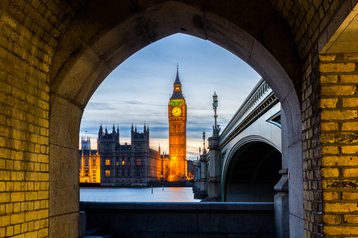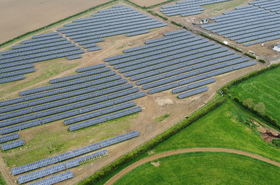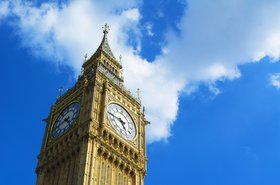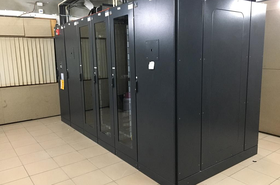On July 4, independence day took its own meaning in the UK. For the first time in 14 years, the UK voted for the Labour party, and the Conservatives moved out of Downing Street.
Labour titled its manifesto "Change," and for much of the UK population, who experienced a cost of living crisis while a series of scandals engulfed the outgoing government, this is exactly what they are hoping for.
But is change coming for the UK's data center industry?
The Labour manifesto addresses data centers directly, albeit briefly, stating: “We will ensure our industrial strategy supports the development of the artificial intelligence (AI) sector, removes planning barriers to new data centers.”
CyrusOne’s director of public policy for Europe, Emma Fryer, takes this optimistically.
Fryer notes that, while AI is considered an important area by all parties, the opposition has “consistently failed to associate this objective with the facilities that will host it, the land that will be needed to accommodate it, the energy that will power it, the planning reform that will enable it and the skilled people who will deliver it.”
She says: “This acknowledgment is a significant step forward, and by recognizing the critical role data centers play in supporting AI and digital innovation, the manifesto highlights an understanding of the interdependence between cutting-edge technology and robust infrastructure.”
Chancellor Rachel Reeves said during her first speech since the election that she had met with the prime minister and deputy prime minister to discuss planning reform, which Reeves sees as paramount to "kick start economic growth" and to "build[ing] the infrastructure we need."
During the speech on Monday, Reeves restated the government's commitment to reforming the National Planning Policy Framework - a document that guides major developments through the planning process but currently fails to address data centers - by the end of the month.
Reeves added that she had asked deputy prime minister Angela Rayner, who also heads up the Department for Levelling Up, Housing and Communities, to revisit two planning applications for data centers - in Buckinghamshire and Hertfordshire - that had previously been rejected by local authorities.
The London hotspot issue
Many of the data centers in the UK, and England specifically, reside around London, spreading out to Slough to the west.
This is for a variety of reasons. The transatlantic cables that land in Cornwall and run to London via the M4 corridor create a well-connected digital highway that data center operators have taken advantage of, resulting in the well-known clusters including Slough, the Docklands, Park Royal, City, and Isle of Dogs.
In addition, London being the capital city has benefits to some industries - including the financial sector - which rely on high-speed digital functions, so being close is a key advantage.
This has, however, caused power constraints similar to those we see across the pond in Loudoun County, Virginia, and delayed projects.
In 2022, the Greater London Authority (GLA) published a document exploring the “West London Electrical Capacity Constraints,” which revealed that major London-based applicants (over circa 1MVA) to the Scottish and Southern Electricity Networks distributed network would have to “wait several years” to receive new electricity connections.
Efforts have since been made to alleviate this, including Ofgem revising its queue management system in November 2023 to try and speed up connections for viable projects and enable stalled or speculative schemes to be “forced out” of the queue. This also saw the National Grid awarded the power to enforce strict milestones for connection agreements.
But energy is an ongoing issue. The Labour manifesto has ambitious energy targets, claiming it will make Britain a “clean energy superpower” with a national mission for clean power by 2030.
To do this it plans to work with the private sector to “double onshore wind, triple solar power, and quadruple offshore wind by 2030” and “will invest in carbon capture and storage, hydrogen and marine energy, and ensure we have the long-term energy storage our country needs.”
In fact, on its first full day in government (July 8), Labour deleted two footnotes in the National Planning Policy Framework that had led to a de facto ban on new onshore windfarms under the previous administration.
The party also plans to create a Great British Energy Company. While Fryer suggests this will be productive in the long term, she notes that this could include a lot of “upheaval and reorganization” which is “unlikely to address the [data center] sector’s immediate need.”
Competitions investigation poses hurdles
Amazon has raised some concerns about the data center sector’s prospects due to potential competition crackdowns.
As reported by The Telegraph, the e-commerce and cloud giant has warned that data center developments could be at risk by the Competition and Markets Authority (CMA) which is currently investigating the cloud computing industry in the UK.
Amazon has stated that intervention by the watchdog in the data center industry could “[prevent] our ability to make these investments,” citing the massive investments that go into constructing data center campuses.
Amazon had previously committed to spending billions on data center infrastructure in the UK, but says that cracking down on fees and incentives makes these developments less likely.
Stuart Hudson, a former adviser to Gordon Brown and former senior strategy director at the CMA, wrote last week that Labour would have to resolve “tensions between competition and industrial policy.”
Green Belt red tape
Regardless, Labour is plowing ahead with its data-center-first approach.
Peter Kyle, new minister in the Department of Science, Innovation and Technology, has vowed to ease planning rules for data centers. This could include designating them as nationally significant infrastructure which would enable local authorities to be overridden and data centers to be developed on London’s Green Belt.
The Green Belt surrounding the UK capital is an area of land protected from most forms of development to prevent urban sprawl, and is also an ideal location for data center development due to the expanse of land and proximity to the capital.
Data center developer Greystoke saw its data center application for Iver in the Green Belt denied in June 2024, for the second time. The company also saw a proposed project in Abbots Langley rejected earlier this year. These are likely the projects recovered by the Deputy Prime Minister.
Sources told the Telegraph last month that easing planning requirements could spark more applications for data centers on the Green Belt, largely expected to center around a corridor in West London.
Reeves acknowledged the role of the green belt in her speech, stating that Angela Raynor would be writing to local planning authorities alongside the National Planning Policy Framework consultation to require reviews of Green Belt boundaries.
Reeves added that regarding data center projects: "The deputy prime minister will also write to local mayors and to the office for investment to ensure that any investment opportunity with important planning considerations that comes across their desks is brought to her attention."
The future of the data center sector under a Labour government remains uncertain. Hell - we are only a handful of days in. But the industry should remain optimistic.
The evidence suggests that at the very least, Labour is taking the importance of data centers seriously, and digital infrastructure will be one of the party's priorities.
Reeves claimed that "in the first 72 hours, we have done more to reform the planning system than the previous government has done in 14 years."
She added: "There is much more to do, more tough decisions to be taken. You have put your trust in us, and we will repay that trust. The work towards a decade of national renewal has begun. There is no time to waste, and we are just getting started."









